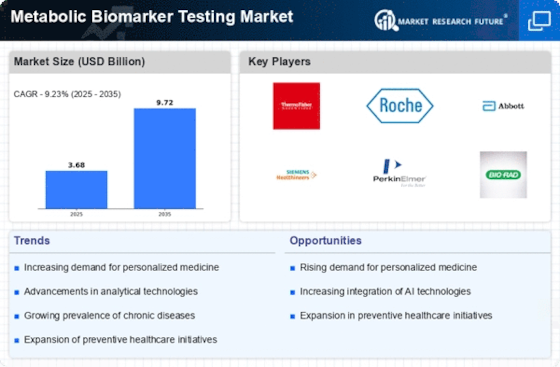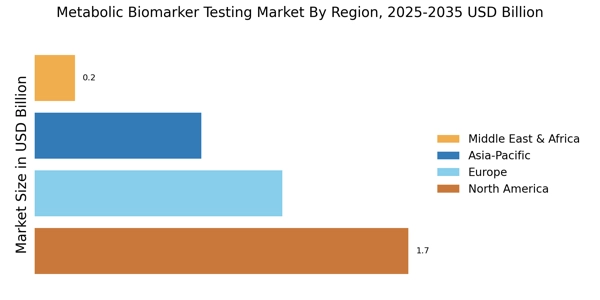Growing Awareness of Metabolic Disorders
There is an increasing awareness of metabolic disorders among healthcare professionals and the general public, which is driving the Metabolic Biomarker Testing Market. Conditions such as diabetes, obesity, and cardiovascular diseases are becoming more prevalent, leading to a heightened focus on early detection and management. This awareness is fostering a demand for metabolic biomarker testing as a means to identify risk factors and monitor disease progression. According to recent estimates, the prevalence of diabetes alone is expected to rise to over 700 million cases by 2045, underscoring the urgent need for effective testing solutions. Consequently, healthcare systems are investing in metabolic biomarker testing to facilitate timely interventions, thereby propelling market growth. The emphasis on preventive healthcare strategies further reinforces the importance of metabolic biomarker testing in managing these conditions.
Regulatory Support for Biomarker Development
Regulatory bodies are increasingly supporting the development and validation of metabolic biomarkers, which is positively influencing the Metabolic Biomarker Testing Market. Initiatives aimed at streamlining the approval process for new biomarkers are being implemented, facilitating quicker access to innovative testing solutions. This regulatory support is crucial for fostering research and development in the field, as it encourages companies to invest in the discovery of novel biomarkers that can improve diagnostic accuracy. Furthermore, the establishment of clear guidelines for biomarker validation is likely to enhance the credibility of metabolic tests, thereby increasing their adoption in clinical practice. As a result, the market is expected to witness a steady influx of new testing options, contributing to its overall expansion. The collaboration between regulatory agencies and industry stakeholders is essential for driving advancements in the Metabolic Biomarker Testing Market.
Rising Investment in Healthcare Infrastructure
The rising investment in healthcare infrastructure is a key driver of the Metabolic Biomarker Testing Market. Governments and private entities are allocating substantial resources to enhance healthcare facilities, particularly in developing regions. This investment is aimed at improving access to diagnostic services, including metabolic biomarker testing, which is essential for effective disease management. As healthcare systems evolve, there is a growing emphasis on integrating advanced diagnostic technologies into routine practice. This trend is likely to result in increased availability of metabolic biomarker testing services, thereby expanding the market. Additionally, the establishment of specialized laboratories and testing centers is expected to facilitate the growth of the industry. The overall enhancement of healthcare infrastructure is anticipated to create a conducive environment for the proliferation of metabolic biomarker testing solutions.
Integration of Artificial Intelligence in Testing
The integration of artificial intelligence (AI) into the Metabolic Biomarker Testing Market is revolutionizing the way tests are conducted and interpreted. AI algorithms are being employed to analyze complex data sets, enabling more accurate predictions of metabolic disorders based on biomarker profiles. This technological advancement not only enhances the reliability of test results but also streamlines the testing process, making it more efficient. As AI continues to evolve, its application in metabolic biomarker testing is expected to expand, potentially leading to the development of personalized testing protocols tailored to individual patient needs. The market for AI-driven diagnostic tools is projected to reach several billion dollars in the coming years, indicating a robust growth trajectory. This trend suggests that the Metabolic Biomarker Testing Market is on the cusp of a transformative phase, driven by the capabilities of AI.
Technological Innovations in Metabolic Biomarker Testing
The Metabolic Biomarker Testing Market is experiencing a surge in technological innovations that enhance testing accuracy and efficiency. Advanced analytical techniques, such as mass spectrometry and high-throughput screening, are being integrated into testing protocols. These innovations not only improve the precision of metabolic biomarker detection but also reduce the time required for results. As a result, the market is projected to grow at a compound annual growth rate of approximately 10% over the next five years. Furthermore, the development of point-of-care testing devices is likely to expand access to metabolic biomarker testing, making it more convenient for patients and healthcare providers alike. This trend indicates a shift towards more sophisticated and user-friendly testing solutions, which could significantly impact the overall landscape of the Metabolic Biomarker Testing Market.


















